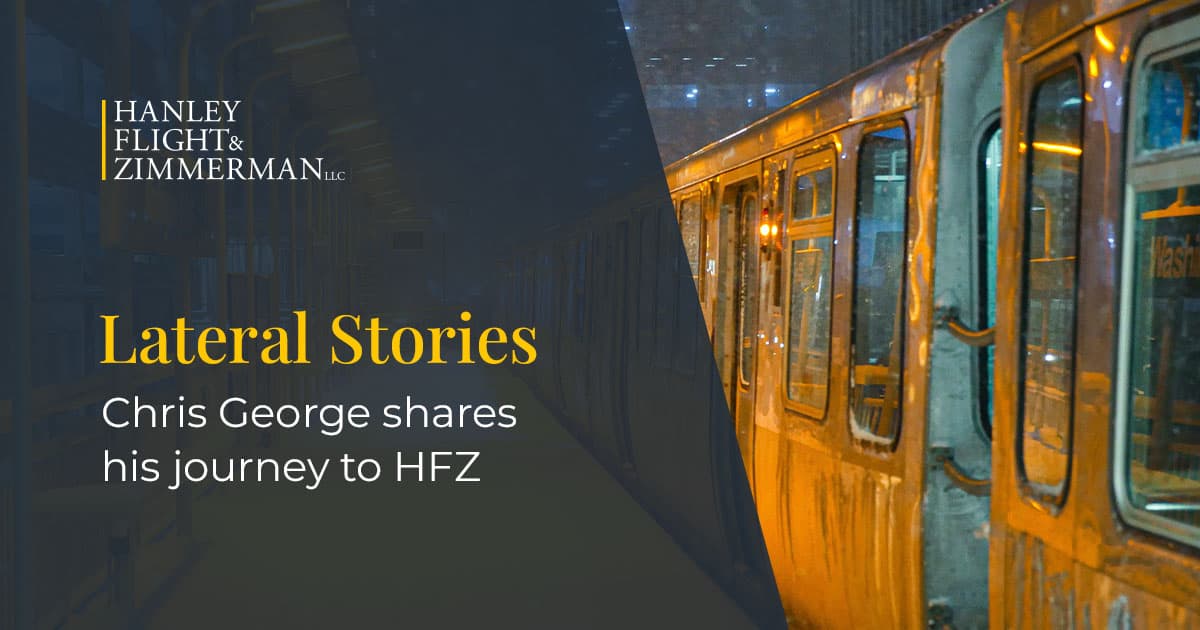Deciding whether to change law firms mid-career can be a difficult choice for patent attorneys. While lawyers may have built up a book of business and close acquaintances at one firm, those comforts can be outweighed by the potential for growth and culture of cooperation that a new firm can offer.
When Chris George decided to join Hanley Flight & Zimmerman nearly 15 years ago, it was his first job change as a professional. He started as a patent engineer at his previous law firm and had been there since before he started law school, working his way up to associate attorney and then partner.
And while he felt like he was making a leap after working at one place for so long, he was drawn to HFZ’s structure as a prosecution-focused patent law firm and the collaboration he’d receive from the team to fulfill his goals.
“It was really attractive to me as an opportunity to grow my prosecution practice and get support on the prosecution side without having to compete with litigators for resources,” he said.
“This path that I found myself interested in was the path that these folks were on as well.
“I’ve been at HFZ for about 14 years and it’s been going really, really well. My hunch at the beginning has turned out to be true.”
Only a few days into his transition to the new role at HFZ, Chris knew he was in the right place when he saw the team jump into action to help him.
Chris says he got a call from a former client and had to explain he wasn’t working at his old firm when they said, ‘Oh, well, can we visit you and meet your new partners?”
HFZ got Chris and the client tickets to a Cubs game and dinner reservations.
“I’ve been there for a couple of days, and they’re making arrangements to meet these folks from out of town,” he said. “They ended up doing business with us.”
Chris says the team of patent engineers, patent agents and associates is another reason why he made a lateral move to HFZ – and why other patent prosecutors should consider the firm as a landing place to grow their career. He likes that there are no silos – no partners who have their dedicated group of associates who can’t work with anyone else.
“You don’t have that period. You work with everybody,” he says. “And it’s nice to leverage the expertise that everybody brings to the table in different circumstances with different subject matter.
“Everybody is trying to do the best job at prosecution and counseling that we can do. Work comes in and it gets allocated, and somebody’s on top of it right away. And we’re very collaborative about going back and forth and reviewing each other’s work and making sure that we’re getting the best work product out the door that we can get.
“We’re in that sweet spot of having a very diversified and strong team, but not too large. You still know everybody that walks down the hall. You can count on everybody.”
Chris says that “count on everybody” feeling extends to the partners and founders too.
“In general, patent attorneys are highly educated – engineers and lawyers, right? – and that has a tendency to draw some big egos. But we’ve done a very good job of maintaining a very flat structure,” he says. “And if the newest patent engineer wants to knock on Mark Zimmerman’s door, or my door, It’s ‘Come on in, let’s have a conversation.’ It’s not, ‘OK, please talk to my assistant and schedule an appointment.’
“There aren’t layers of bureaucracy that you find at some other places. It’s a very open, approachable atmosphere. We’re all here to get the job done and do the best work that we can for our clients, and we all love learning about technology and love the law. And I think that makes it a very, very nice environment to come to work and be part of.”

